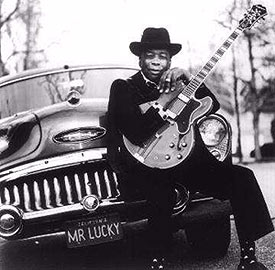John Lee Hooker, Anthology 50 Years
Published on March 30th, 2009 in: Issues, Music, Music Reviews, Retrovirus, Reviews |Disc two includes Hooker tracks from 1964 through 1996. Much like the first disc, the tracks tend toward the more upbeat. Even the full-band version of “Serves Me Right To Suffer” is relatively upbeat, compared to the older, slower, solo version I’m used to. That said, the earlier tracks on disc two come from the sixties “revival” boom of interest in folk and blues, when—especially in the States—young white kids were discovering the music they’d been ignoring (or were just unexposed to) for years. The downside to this revival, in my humble opinion, was that there seemed to often be a focus on presenting the blues at its most “danceable,” rather than in its deepest form.

Photo © Steve Lewis, 1991
Courtesy of Pointblank/Charisma Records
A quick search on YouTube of most any bluesman alive and performing at that time (with the exception of Son House) will likely produce several TV appearances of bluesmen backed by full bands, playing brisk versions of classics to large crowds of mostly white kids, American Bandstand-style. The version of “I Cover The Waterfront” here while still quite listenable and pleasant, is a little strange with its horn overdubs and organ backing. Muddy Waters and members of his band at that time back Hooker on a live version of “I’m Bad Like Jesse James” recorded in 1966, providing a rare treat; Muddy and Hook together are pretty spectacular. Canned Heat does a more than credible job of “keeping it real” with Hooker on “Peavine,” recorded in 1970.
From this point on. . . well, there are two ways of looking at it: on one hand, since this is a retrospective anthology, it makes historical sense to include later tracks that maybe aren’t up to snuff, because Hooker did them. On the other, it’s painful at times to hear him fettered by bad, dated-sounding production and collaborations with musicians that aren’t in his league, or at times, even in his genre. Some of these, such as tracks with Robert Cray and Albert Collins, aren’t all that bad, but aren’t all that good either, though to his credit, it’s never Hooker who lacks on any of these later collaborations. “I’m in the Mood,” a duet with Bonnie Raitt, would probably be great were it not for the very dated, late-Eighties production, and if it were left a little more spare. Listening to this track, bad recording aside, it’s remarkable how well Raitt keeps up with Hooker, much better than her male contemporaries do.
The two tracks with Carlos Santana should be locked away and never heard again. Carlos Santana may be the nicest, sweetest guy on Earth for all I know, so I hate to be mean, but I can tell you this: he needs to stop making bad tracks with musicians he stylistically has little or nothing to do with. I’m generally a fan of musical hybrids, but the songs with Santana on disc two made me cringe. “Don’t Look Back,” with Van Morrison, though it sounds just a little weird to me, is a pleasant ending to the anthology.
The liner notes here are quite good, with an essay by music journalist and scholar Jas Obrecht, several great photos of Hooker, and extensive production credits for each track. Taken as a whole, Anthology 50 Years may not be the last word in John Lee Hooker compilations, but it’s a more than serviceable first one. I’d recommend it as a starting point for anyone checking John Lee Hooker out for the first time, but I’d hope it isn’t also the ending point, since there is so much more Hook out there to fall in love with.
You can order this CD directly from the Shout! Factory website by clicking here.
Pages: 1 2
Time limit is exhausted. Please reload the CAPTCHA.